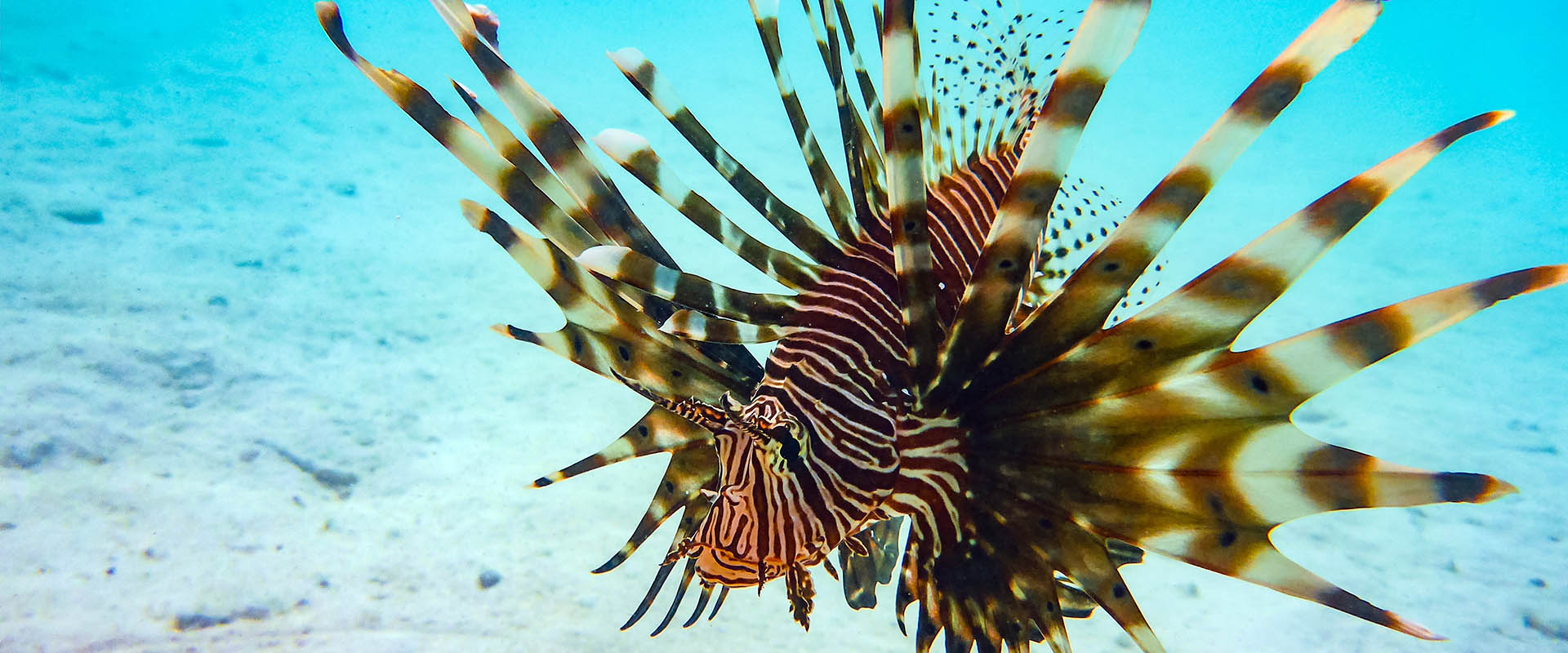Liveaboard Diving in Central Atolls
What to expect on a Central Atolls Liveaboard
A liveaboard to the Central Atolls is one of those rare dive cruises where you can hop off a plane and on to a dive liveaboard easily. In this area, the Maldives capital Male receives international flights and sends out liveaboards virtually next door, and the underwater sensations begin right on Male's doorstep. Some of the most famous Central Atolls liveaboard diving locations include North Male Atoll, South Male Atoll, Ari Atoll, Felidhoo (Vaavu) Atoll, and Rasdhoo Atoll. It was the first area of the Maldives discovered by dive tourism, and its channels, pinnacles, sharks, and mantas have never lost their appeal.
Central Atolls Underwater
All the quintessential Maldives liveaboard diving experiences can be found within the Central Atolls. This includes big pelagics, sharks, mantas, channels, pinnacles, and colorful coral gardens. In fact, some Central Atolls dive locations are the best of the best in the Maldives; Ari Atoll, for example, is the premier Maldives site for whale shark-watching, and Rasdhoo Atoll gets the most reliable visits from schools of hammerhead sharks. The list goes on with North Male Atoll's manta rays and Felidhoo Atoll's reef sharks. On Central Atolls dive cruises, you'll probably see other divers and boats in the area, unlike in more far-flung regions of the Maldives. However, there are still quiet spots within the Central Atolls, and you'll probably be so amazed by the marine life that having company doesnít make a huge difference.
Dive Areas Of Central Atolls
NORTH MALE ATOLL, hosts fewer resorts and slightly quieter, better-preserved reef ecosystems than its southern counterpart. From your North Male dive dhoni, you should expect to take the plunge in a wide variety of reef ecosystems; North Male's underwater topography includes drop-offs, caves, coral gardens, and even some artificial reefs that have bloomed on shipwrecks in its shipping channel. In North Male, a couple reefs even sport pristine hard coral cover, and mantas can be reliably seen in huge numbers at renowned dive sites like Manta Point.
SOUTH MALE ATOLL is famous for its kandus, which are channels that connect the interior of an atoll to the open ocean. No fewer than six kandus provide highways for strong, nutrient-rich currents to enter South Male Atoll, attracting loads of fish. This area is a great location for reef sharks and a variety of large pelagics. While South Male offers more sharks than North Male, the hard coral cover remains better in North Male (though South Male Atoll dive tours enjoy abundant colorful soft corals at many sites).
ARI ATOLL For whale sharks, manta rays, and other pelagics, Maldives Central Atolls liveaboard diving doesnít get much better than here. Ari is located to the northwest of North Male Atoll, and it is bound to be included as a destination on virtually all liveaboards sailing the Central Atolls. Scuba divers plunge into the waters of Ari Atoll for the promise of spectacular pelagic encounters amongst the atollís kandus and thilas. (Thilas are volcano-shaped pinnacles rising from the depths of the sea; theyíre a magnet for sea life). Turtles and reef sharks are common at Ari. Corals are not as good as at North Male, however.
RASDHOO ATOLL Just northeast of Ari Atoll lies Rasdhoo Atoll, where the dive site Hammerhead Point offers an experience that many call the highlight of their Maldives dive cruises: schooling scalloped hammerhead sharks. At this site, a deep-water drop-off beckons these denizens of the deep to shallow areas early in the morning, on one corner of a local kandu (channel) by an island called Madivaru,. The topography of the ridge itself holds its own appeal, with caves and crevices to explore, but make sure to keep one eye on the blue. Besides huge schools of hammerheads, other big pelagics like tuna and dolphin fish can be seen.
FELIDHOO/FELIDHE ATOLL is a bit south of the Central Atolls area but often included on Central Atolls dive tours, also known as Vaavu. The kandus here are deep, and the currents are fast, which means that the reef life is spectacular. Schooling reef sharks are a given, as well as mantas, big pelagic fish, and big reef fish. In fact, the dive site Fotteyo Kandu is meant to be one of the Maldives' top dive sites for interesting, interactive topography and reef life.
Top Tips For Divers
In the Maldives, a new Green Tax of 6 USD per person per night applies for every tourist in the country. The official language is Maldivian, also called Dhivehi.
Gear to bring includes your own mask, booties, fins, and dive computer. These are personalised pieces of equipment which we don't recommend renting. An ill-fitting mask or pair of fins can make diving virtually impossible, and a dive computer is your most important piece of safety equipment.
Getting To Central Atolls
Like anywhere in the Maldives, the Central Atolls are best dived by liveaboard; in no other way can you access so many dive sites, often near uninhabited islands or far from land. The length of Maldives liveaboard itineraries in the Central Atolls usually ranges from 7 to 10 nights, with a budget from a bit over 200 to 350 euros per night. Central Atolls liveaboards often commit to a northern or southern route to fit in a bit more of Ari and Baa (to the north), or Vaavu and Meemu (to the south).
Male is the main liveaboard departure location for Central Atolls liveaboards, accessible by direct flights from Dubai, Singapore, and Colombo. Longer international flights from Europe, America, China, India, and Australia often connect through the regional airports mentioned above.
Diving the Central Atolls is possible all year round, but the northeast monsoon from December to May allows the calmest surface conditions and the least rain. The water temperature usually stays between 26 and 29 C, and visibility between 10 and 30 meters.
The Central Atolls are the most convenient dive sites for a Maldives liveaboard. The North Male Atoll has an impressive topography of caves, drop-offs and overhangs, and the South Male Atoll is better-known for large pelagics. A variety of sharks, mantas, turtles are often seen when diving here.
Central Atolls Diving Reviews
- 9.2 Superb
- 10.0 Exceptional
- Laura S
United States
Visibility is good, but some of the channel dives had current. Most of the dives were deep (20-30 meters) - Nitrox is recommended so you don't have to worry about deco limits.
Diving Central Atolls in January on the Princess Sara
- 8.0 Very good
- Karl E
United States
Visibility continuing to improve, lots of sea life, large and small
Diving Central Atolls in May on the Emperor Leo
- 9.2 Superb
- Pauline P
United States
Great - nice currents bringing in big life, lots of healthy reefs, loads of fish
Diving Central Atolls in December on the Emperor Voyager
- 8.8 Fabulous
- Courtney C
United States
Good. Not great visibility.
Diving Central Atolls in December on the Emperor Serenity
- 9.6 Exceptional
- Tate A
United States
Diving the house reef at night never disappoints
Diving Central Atolls in September on the Scubaspa Yang
- 8.0 Very good
- Karen J
United States
Amazing mantas feeding station
Diving Central Atolls in September on the Princess Sara
- 10.0 Exceptional
- Margaret Sheryl W
United States
Drift diving with Manta rays was a really fun ride!!!
Diving Central Atolls in September on the Scubaspa Ying
- 10.0 Exceptional
- David P
United States
The central atolls are varied in size depth and aquatic life. Very cool.
Diving Central Atolls in June on the Emperor Leo
- 8.8 Fabulous
- dominic K
United States
Ari atoll was excellent for manta and whale shark snorkel
Diving Central Atolls in December on the Emperor Voyager
- 8.4 Very good
- Lee R
Australia
Good conditions in February - currents moderate, seas moderate ( no problems crossing between atols).
Diving Central Atolls in February on the Amba Liveaboard











